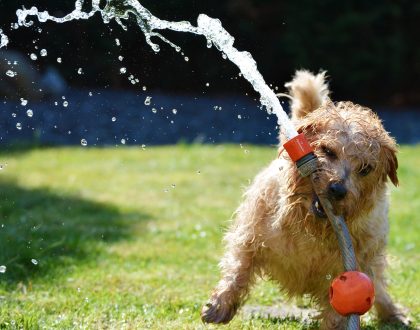Why do dogs mark territory?
Why do dogs mark territory?
All dog owners know that dogs can be territorial animals and like to mark territory. It’s their way of putting their name on things.
There are different ways a dog has of expressing that he perceives an area to be his own. It may be a simple bark at something he feels to be a threat. Or, as a more serious statement, some dogs will urinate to mark territory and “stake their claim”. This is the kind of behaviour we do not want to happen in our homes.
Understanding why this behaviour may be happening goes a long way in helping us to prevent it.
Given that urinating in the house is not a behaviour we want from our pooches, we need to learn why a dog may persistently do so. We especially need to remember that dogs aren’t people (in the scientific term – emotionally, sure).
Dogs don’t mark territory out of spite or jealousy
Dogs do not urinate out of spite or jealously. Unfamiliar scents around his home can cause him to mark and protect his territory. For example, if he urinates on baby toys or blankets it is not because he is jealous of the new baby. He is simply marking a new scent. This new scent may be stressing him and he possible feels he needs to reclaim his territory.
Understanding that introducing new scents and objects can spark this kind of marking and territorial behaviour can help us to defuse it before it begins. If your dog urinates on your new partner’s shoes it is not reflective of his opinion of this person. He is simply aware that there is a new scent and he is letting you know that he has it under control and has reclaimed the territory. In his mind, he is doing good.
Difference between soiling and territory marking
It is important to recognise the difference between marking and soiling.
House soiling is when your dog empties his bladder or defecates inside the house. There are a few reasons he may do this:
- He’s not yet housetrained.
- He has a medical issue.
- He’s anxious/excited and has lost control of his bladder and/or bowel.
Territory marking will typically be smaller amounts of urine, depending on how much of a threat your dog thinks this new scent is.
Male dogs are more likely to exert territorial behaviours. Leg lifting is the most common sign of marking. However, female dogs may mark territory too.
A summary of the reasons a dog may mark territory
- Your dog isn’t spayed or neutered. Undesexed dogs are much more assertive and prone to marking than desexed ones.
- There’s a new pet in the household.
- Another pet in your home is not spayed or neutered. Even spayed or neutered animals may mark in response to other intact animals in the home.
- Your dog has conflicts with other animals in your home. When there’s instability in the pack dynamics, a dog may feel a need to establish his place and mark territory.
- There’s someone new in the house (spouse, baby, roommate) and your dog puts his scent on that person’s belongings as a way of proclaiming that the house is his.
See 7 Tips To Prevent Your Dog Marking Their Territory.
Scroll down to subscribe to our emails with interesting information about dogs. (Don’t worry, we promise not to flood your Inbox with too many emails.)
Recommended Posts

Lickimat – 20% OFF
February 27, 2024

Hot weather and your dog
January 05, 2024

Frozen Kong recipes
January 05, 2024
